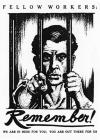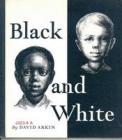Wesley Everest was a Wobbly -- he fought the Wobbly fight
For better pay, the eight-hour day, a warm, dry bed at night
But townfolks called 'em Red and tried to chase 'em out of town
But Everest turned and killed a man, and they brought that Wobbly
down
Since nineteen-nineteen when he died, the Wobs still tell the tale
How the lights went out in town and how they dragged him from the jail
His tortured body hung that night from a place called Hangman's Bridge
And silence and a grave now mark the town's grim heritage
And we stood in a circle and remembered how he died
Though it happened many years ago, a few among us cried
And we wondered if his troubled soul still wandered this old town
On the day we sang Wes Everest down - let it be-
On the day we sang Wes Everest down
Wesley never had a funeral and his grave was lost for years
But seventy years later, we all gathered near
And we sang "Joe Hill" and "Casey Jones" and "Preacher and the Slave"
And someone read the Wob Preamble over Wesley's grave
The cold November rain came down like tears from unseen eyes
And a million fellow workers voices sang and harmonized
An injury to one has been an injury to all
Let honor mark his gravestone. Let justice be his pall
And we stood in a circle and remembered how he died
Though it happened many years ago, a few among us cried
And we wondered if his troubled soul still wandered this old town
On the day we sang Wes Everest down - let it be-
On the day we sang Wes Everest down
For better pay, the eight-hour day, a warm, dry bed at night
But townfolks called 'em Red and tried to chase 'em out of town
But Everest turned and killed a man, and they brought that Wobbly
down
Since nineteen-nineteen when he died, the Wobs still tell the tale
How the lights went out in town and how they dragged him from the jail
His tortured body hung that night from a place called Hangman's Bridge
And silence and a grave now mark the town's grim heritage
And we stood in a circle and remembered how he died
Though it happened many years ago, a few among us cried
And we wondered if his troubled soul still wandered this old town
On the day we sang Wes Everest down - let it be-
On the day we sang Wes Everest down
Wesley never had a funeral and his grave was lost for years
But seventy years later, we all gathered near
And we sang "Joe Hill" and "Casey Jones" and "Preacher and the Slave"
And someone read the Wob Preamble over Wesley's grave
The cold November rain came down like tears from unseen eyes
And a million fellow workers voices sang and harmonized
An injury to one has been an injury to all
Let honor mark his gravestone. Let justice be his pall
And we stood in a circle and remembered how he died
Though it happened many years ago, a few among us cried
And we wondered if his troubled soul still wandered this old town
On the day we sang Wes Everest down - let it be-
On the day we sang Wes Everest down
Contributed by Alessandro - 2009/10/1 - 12:07
Una poesia su Wesley Everest scritta da un suo compagno, Ralph Chaplin ((1887—1961).
Chaplin, attivista sindacale fin da giovanissimo, combattè nell'esercito zapatista durante la rivoluzione messicana. Tornato a Chicago lavorò in molte organizzazioni dei lavoratori, soprattutto come grafico. Fu animatore, con Mother Jones, degli scioperi dei minatori del 1912-13. Fu Chaplin a scrivere nel 1915 la canzone "Solidarity Forever", diventata subito l'inno dell'Industrial Workers of the World (IWW). Nel 1917 fu arrestato e processato, insieme ad altri "comunisti", con le imputazioni di rifiuto del servizio militare e incoraggiamento alla diserzione. Si fece 20 anni. In galera scrisse "Bars And Shadows: The Prison Poems".
Alla mano di Ralph Chaplin è anche accreditato il disegno del gatto nero incazzato, simbolo usato dall'IWW durante le azioni di sabotaggio e poi divenuto - e lo è ancora oggi - uno degli emblemi dell'anarco-sindacalismo mondiale.
The Wild Black Cat, by Ralph Chaplin.
WESLEY EVEREST
(Pubblicata sull'"Industrial Pioneer", luglio 1921)
Torn and defiant as a wind-lashed reed,
Wounded he faced you as he stood at bay;
You dared not lynch him in the light of day,
But on your dungeon stones you let him bleed;
Night came and you black vigilants of Greed.
Like human wolves, seized hard upon your prey,
Tortured and killed and silently slunk away
Without one qualm of horror at the deed.
Once, long ago do you remember how
You hailed Him king for soldiers to deride -
You placed a scroll above His bleeding brow
And spat upon Him, scrouged Him, crucified
A rebel unto Caesar - then as now
Alone, thorn-crowned, a spear wound in his side!
Chaplin, attivista sindacale fin da giovanissimo, combattè nell'esercito zapatista durante la rivoluzione messicana. Tornato a Chicago lavorò in molte organizzazioni dei lavoratori, soprattutto come grafico. Fu animatore, con Mother Jones, degli scioperi dei minatori del 1912-13. Fu Chaplin a scrivere nel 1915 la canzone "Solidarity Forever", diventata subito l'inno dell'Industrial Workers of the World (IWW). Nel 1917 fu arrestato e processato, insieme ad altri "comunisti", con le imputazioni di rifiuto del servizio militare e incoraggiamento alla diserzione. Si fece 20 anni. In galera scrisse "Bars And Shadows: The Prison Poems".
Alla mano di Ralph Chaplin è anche accreditato il disegno del gatto nero incazzato, simbolo usato dall'IWW durante le azioni di sabotaggio e poi divenuto - e lo è ancora oggi - uno degli emblemi dell'anarco-sindacalismo mondiale.
The Wild Black Cat, by Ralph Chaplin.
WESLEY EVEREST
(Pubblicata sull'"Industrial Pioneer", luglio 1921)
Torn and defiant as a wind-lashed reed,
Wounded he faced you as he stood at bay;
You dared not lynch him in the light of day,
But on your dungeon stones you let him bleed;
Night came and you black vigilants of Greed.
Like human wolves, seized hard upon your prey,
Tortured and killed and silently slunk away
Without one qualm of horror at the deed.
Once, long ago do you remember how
You hailed Him king for soldiers to deride -
You placed a scroll above His bleeding brow
And spat upon Him, scrouged Him, crucified
A rebel unto Caesar - then as now
Alone, thorn-crowned, a spear wound in his side!
Alessandro - 2009/10/2 - 13:56
×
![]()
Note for non-Italian users: Sorry, though the interface of this website is translated into English, most commentaries and biographies are in Italian and/or in other languages like French, German, Spanish, Russian etc.








Album "Washington Notebook"
Scritta in occasione dei 70 anni dal cosiddetto "Centralia Massacre"
Questa canzone è dedicata a Wesley Everest (1890-1919), un boscaiolo dell'Oregon, veterano della prima guerra mondiale e attivista del sindacato Industrial Workers of the World (IWW).
L'11 novembre 1919, a Centralia (Washington), durante le celebrazioni per il giorno dell'armistizio, membri della American Legion, un'associazione di veterani invasati e fascistoidi, attaccò la locale camera del lavoro, sede dell'IWW, dei "Reds". Wesley Everest e i suoi compagni si difesero e durante gli scontri 4 aggressori rimasero uccisi. Pare che Everest li avesse avvertiti dicendo loro: "I fought for democracy in France and I'm going to fight for it here. The first man that comes in this hall, why, he's going to get it."
Everest fu arrestato per l'omicidio di due dei 4 uomini uccisi.
Poco dopo l'arresto, la prigione dove era stato rinchiuso fu assalita da altri membri della Legione... Everest fu tirato fuori a viva forza, fu colpito coi calci dei fucili, castrato, linciato... il suo corpo massacrato fu impiccato ad un albero vicino ad un fiume...
Nessuno fu mai incriminato per il selvaggio delitto.
(fonte: en.wikipedia)
"Washington's Birthday, November 11th, also happened to be the anniversary of the Centralia Massacre of 1919. On this day, the last of this project, I stood in the rain with a dozen others at the grave of Wesley Everest, singing songs and remembering him. Earl Robinson, composer of "I Dreamed I Saw Joe Hill Last Night" was also there, having recently moved back to the Northwest. We all sang "Solidarity Forever" and other songs of the I.W.W." (Linda Allen)